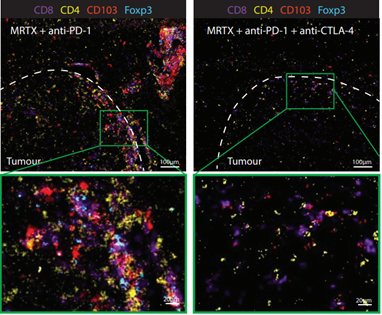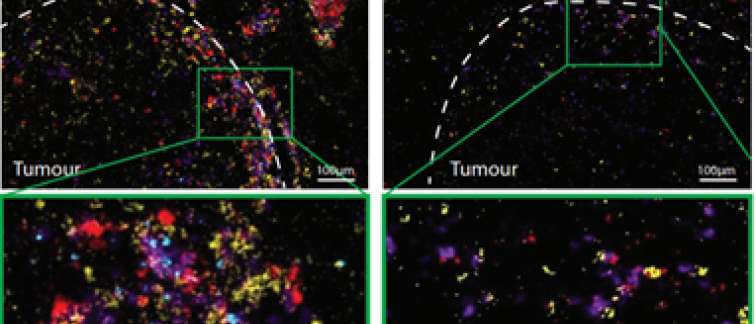Drugs that block a cancer-causing protein called KRAS-G12C are approved for use in lung cancer but often fail to work long-term because the tumours can develop resistance over time. Scientists are now exploring the development of new combination treatment strategies to boost the immune system alongside blocking cancer-causing genes. But these will only work if immune cells are able to attack the cancer.
In new research published today in Science Advances, the researchers used a technique called imaging mass cytometry to see the distribution of immune cells around lung tumours in mice with KRAS mutations. They saw that clusters of fighter cells called T cells were gathered near the tumours, as well as dendritic cells, which present signals to recruit more T cells to the site. When the mice were given a KRAS inhibitor drug, these cell communities grew in size and were able to enter the tumour. However, they still couldn’t launch an immune response against the cancer cells. Using computational analysis of the cell clusters, the researchers could reveal that the cell community also contained regulatory T cells (Tregs), which were stopping immune cell coordination.
When the researchers blocked the action of Tregs, the mice responded better to the KRAS inhibitor, showing reduced tumour growth and longer survival. The team concluded that Tregs are applying the brakes on an immune response, even where immune cells are present and ready to attack a tumour.
Julian Downward, Principal Group Leader of the Oncogene Biology Laboratory at the Crick, and senior author, said: “Lung cancer is one of the hardest types of cancer to treat, so working out how to harness the immune system to better target tumours is so important. “Regulatory T cells are designed to stop the immune system fromgetting out of control, but it’s clear that they aren’t working as they should be next to cancer cells. Adding drugs that block Tregs to our combination treatments could help to reduce resistance to drugs like KRAS inhibitors.” Blocking Tregs throughout the body could cause side effects as a result of the immune system becoming overactive, so the researchers are now exploring how to specifically block them in the tissues surrounding tumours.
Julian worked with first author Megan Cole, PhD student at the Crick, and Febe van Maldegem, Assistant Professor in the Department of Molecular Cell Biology and Immunology at Amsterdam UMC.

Clusters of T cells and dendritic cells in red, yellow and purple, are gathered at the edge of the tumour, intermixed with inhibitory Tregs, in blue (top left panel, zoomed in bottom left panel). Blocking the Tregs resolves these cell clusters, enabling the cells to move around and attack the tumour (right panels).
For further information, contact: press@crick.ac.uk or +44 (0)20 3796 5252
Publication
Cole, M. et al. (2024). Spatial multiplex analysis of lung cancer reveals that regulatory T cells attenuate KRAS-G12C inhibitor-induced immune responses. Science Advances. 10.1126/sciadv.adl6464.
The Francis Crick Institute is a biomedical discovery institute dedicated to understanding the fundamental biology underlying health and disease. Its work is helping to understand why disease develops and to translate discoveries into new ways to prevent, diagnose and treat illnesses such as cancer, heart disease, stroke, infections, and neurodegenerative diseases.
An independent organisation, its founding partners are the Medical Research Council (MRC), Cancer Research UK, Wellcome, UCL (University College London), Imperial College London and King’s College London.
The Crick was formed in 2015, and in 2016 it moved into a brand new state-of-the-art building in central London which brings together 1500 scientists and support staff working collaboratively across disciplines, making it the biggest biomedical research facility under a single roof in Europe.

